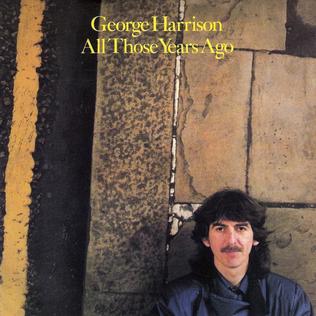
"All Those Years Ago" is a song by the English rock musician George Harrison, released in May 1981 as a single from his ninth studio album Somewhere in England. Having previously recorded the music for the song, Harrison tailored the lyrics to serve as a personal tribute to his former Beatles bandmate John Lennon, following the latter's murder in 1980. Ringo Starr played drums, and Paul McCartney overdubbed backing vocals onto the basic track. The single spent three weeks at number 2 on the US Billboard Hot 100, behind "Bette Davis Eyes" by Kim Carnes, and it peaked at number 13 on the UK Singles Chart. It also topped Canada's RPM singles chart and spent one week at number 1 on Billboard's Adult Contemporary listings.

Flaming Pie is the tenth solo studio album by English musician Paul McCartney, released on 5 May 1997 by Parlophone in the UK and Capitol Records in the US. His first studio album in over four years, it was mostly recorded after McCartney's involvement in the highly successful Beatles Anthology project. The album was recorded in several locations over two years, between 1995 and 1997, featuring two songs dating from 1992.
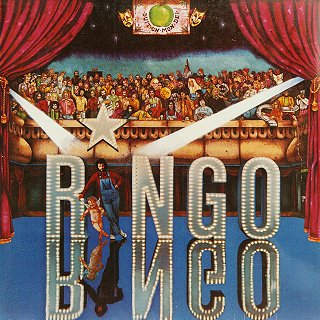
Ringo is the third studio album by English musician Ringo Starr, released in 1973 on Apple Records. It peaked at No. 7 on the UK Albums Chart and No. 2 on the Billboard 200 and has been certified platinum by the RIAA. In Canada, it reached No. 1 on the RPM national albums chart.

"I Feel Fine" is a song by the English rock band the Beatles that was released in November 1964 as the A-side of their eighth single. It was written by John Lennon and credited to the Lennon–McCartney partnership. The recording includes one of the earliest uses of guitar feedback in popular music.

"Birthday" is a song by the English rock band the Beatles from their 1968 double album The Beatles. Written by John Lennon and Paul McCartney, mainly by McCartney, it is the opening track on the third side of the LP. Surviving Beatles Paul McCartney and Ringo Starr performed it for Starr's 70th birthday at Radio City Music Hall on 7 July 2010.

Pipes of Peace is the fourth solo studio album by English singer-songwriter Paul McCartney, released on 31 October 1983. As the follow-up to the popular Tug of War, the album came close to matching the commercial success of its predecessor in Britain but peaked only at number 15 on America's Billboard Top LPs & Tape chart. While Pipes of Peace was the source of international hit singles such as "Say Say Say" and the title track, the critical response to the album was less favourable than that afforded to Tug of War.
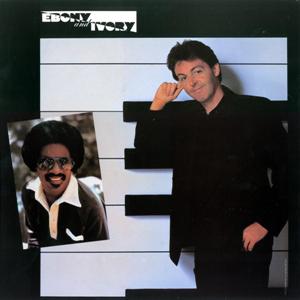
"Ebony and Ivory" is a song that was released in 1982 as a single by Paul McCartney featuring Stevie Wonder. It was issued on 29 March that year as the lead single from McCartney's third solo album, Tug of War (1982). Written by McCartney, the song aligns the black and white keys of a piano keyboard with the theme of racial harmony. The single reached number one on both the UK and the US charts and was among the top-selling singles of 1982 in the US. During the apartheid era, the South African Broadcasting Corporation banned the song after Wonder dedicated his 1984 Academy Award for Best Original Song to Nelson Mandela.
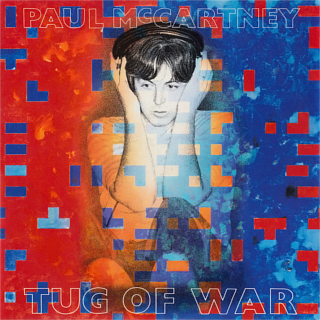
Tug of War is the third solo studio album by the English musician Paul McCartney, released on 26 April 1982. It is his 11th album overall following the break up of the Beatles in 1970, his first album released after the dissolution of his band Wings the previous year, and his first album following the murder of his former songwriting partner John Lennon. The cover features an abstract oil painting by the artist Brian Clarke, a frequent McCartney collaborator, incorporating an overpainted transparency of a portrait of Paul taken by Linda McCartney.
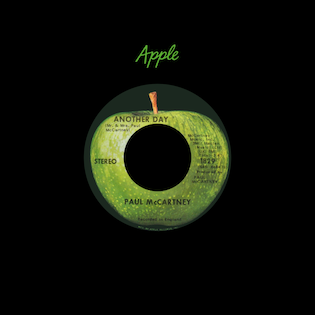
"Another Day" is a song by English rock musician Paul McCartney that was released as the A-side of a non-album single in February 1971. It was his debut single as a solo artist following the Beatles break-up in 1970. McCartney credited his wife Linda as a co-writer on the song, triggering legal action from ATV on behalf of the publishing companies Northern Songs and Maclen Music. The lyrics describe the daily routine of a lonely woman, using an observational style similar to McCartney's narrative in the 1966 ballad "Eleanor Rigby".
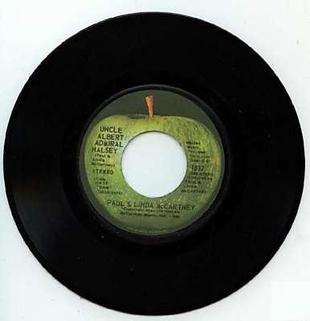
"Uncle Albert/Admiral Halsey" is a song by Paul and Linda McCartney from the album Ram. Released in the United States as a single on 2 August 1971, it reached number one on the Billboard Hot 100 on 4 September 1971, making it the first of a string of post-Beatles, Paul McCartney-penned singles to top the US pop chart during the 1970s and 1980s. Billboard ranked the song as number 22 on its Top Pop Singles of 1971 year-end chart. It became McCartney's first gold record after the breakup of the Beatles.

"Helen Wheels" is a song by the English-American rock band Paul McCartney and Wings. The song was named after Paul and Linda McCartney's Land Rover, which they nicknamed "Hell on Wheels".

"Jet" is a song by Paul McCartney and Wings from their third studio album Band on the Run (1973). It was the first British and American single to be released from the album.
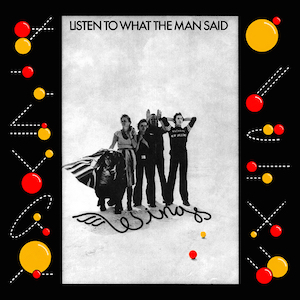
"Listen to What the Man Said" is a hit single from Wings' 1975 album Venus and Mars. The song featured new member Joe English on drums, with guest musicians Dave Mason on guitar and Tom Scott on soprano saxophone. It was a number 1 single on the Billboard Hot 100 in the US the week of July 19, 1975 and reached number 1 in Canada on the RPM National Top Singles Chart. It also reached number 6 in the UK, and reached the top ten in Ireland, Norway and New Zealand and the top twenty in the Netherlands. The single was certified Gold by the Recording Industry Association of America for sales of over one million copies.

"Letting Go" is a song credited to Paul and Linda McCartney and originally released by Wings on their 1975 album Venus and Mars. The song was remixed and released as a single on 4 October 1975 in the United States, and on 18 October 1975 in the United Kingdom. The song peaked at number 41 in the UK, 41 on the Cash Box Top 100 and number 39 on the Billboard Hot 100.
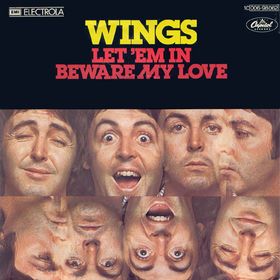
"Let 'Em In" is a song by Wings from their 1976 album Wings at the Speed of Sound. It was written and sung by Paul McCartney and reached the top 3 in the United Kingdom, the United States and Canada. It was a No. 2 hit in the UK; in the U.S. it was a No. 3 pop hit and No. 1 easy listening hit. In Canada, the song was No. 3 for three weeks on the pop chart and No. 1 for three weeks on the MOR chart of RPM magazine. The single was certified Gold by the Recording Industry Association of America for sales of over one million copies. It can also be found on McCartney's 1987 compilation album, All the Best! A demo of the song, featuring Denny Laine on lead vocal, was included as a bonus track on the Archive Collection reissue of Wings at the Speed of Sound.
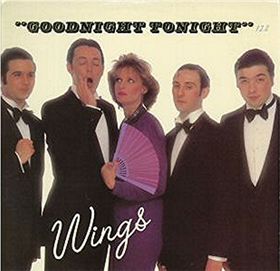
"Goodnight Tonight" is a song by the British–American rock band Wings. Written and produced by Paul McCartney, it was released as a non-album single on 23 March 1979 by Parlophone in the UK and Columbia Records in the US. It was recorded during the sessions for the band's 1979 album Back to the Egg and is notable for its disco-inflected sound and spirited flamenco guitar break.

"Getting Closer" is a rock song from the British rock band Wings, Paul McCartney's post-Beatles band. The song was released on the album Back to the Egg.

"Spies Like Us" is the title song to the 1985 Warner Bros. motion picture of the same name, starring Chevy Chase, Dan Aykroyd, and Donna Dixon. It was written and performed by Paul McCartney, and reached number 7 on the Billboard singles chart in early 1986, making it McCartney's last US top ten hit until 2015's "FourFiveSeconds". It also reached #13 in the UK.

"Tug of War" is the title track from Paul McCartney’s 1982 album Tug of War.

"Stranglehold" is a song by the English musician Paul McCartney, written by McCartney and 10cc guitarist Eric Stewart for his sixth solo studio album Press to Play. It was issued as single in the US, Canada and Japan and reached number 81. The B-side featured the remix of "Angry" by Larry Alexander taken from the previous single "Pretty Little Head".




















